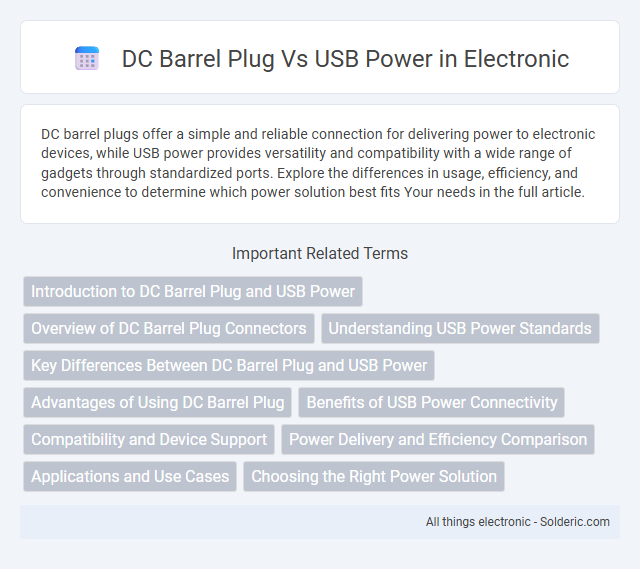DC barrel plugs offer a simple and reliable connection for delivering power to electronic devices, while USB power provides versatility and compatibility with a wide range of gadgets through standardized ports. Explore the differences in usage, efficiency, and convenience to determine which power solution best fits Your needs in the full article.
Comparison Table
| Feature | DC Barrel Plug | USB Power |
|---|---|---|
| Voltage Range | Typically 5V to 24V | Typically 5V, USB Power Delivery up to 20V |
| Current Capacity | Up to 5A or more depending on size | Up to 5A with USB PD |
| Connector Type | Round barrel connector, various sizes | Standardized USB plugs (Type-A, Type-C) |
| Use Cases | Powering routers, small devices, CCTV cameras | Charging phones, tablets, laptops; data transfer |
| Polarity | Central pin positive, outer sleeve negative (commonly) | Standardized, reversible with USB-C |
| Ease of Use | Simple plug, no data transmission | Plug-and-play, supports power & data |
| Compatibility | Device-specific; multiple sizes | Widely compatible with USB-enabled devices |
Introduction to DC Barrel Plug and USB Power
DC barrel plugs provide a reliable, low-voltage power connection commonly used in laptops, routers, and other electronic devices, delivering stable direct current (DC) power through a cylindrical connector. USB power, on the other hand, offers a versatile and standardized solution that supports data transfer alongside power delivery, widely adopted in smartphones, tablets, and modern accessories. Choosing between DC barrel plug and USB power depends on your device's power requirements, compatibility, and need for additional functionalities like data communication.
Overview of DC Barrel Plug Connectors
DC barrel plug connectors are cylindrical connectors commonly used for low-voltage power supply connections in electronics, featuring a metal outer sleeve and a central pin for positive voltage. These connectors provide a secure, polarity-specific connection for devices requiring a fixed voltage input, ranging typically from 5V to 24V DC. They are favored for their simplicity, reliable contact, and widespread compatibility with power adapters in consumer electronics, contrasting with USB power which supports data transfer and variable power delivery profiles.
Understanding USB Power Standards
USB power standards include USB 2.0 delivering up to 2.5W (5V, 0.5A), USB 3.0 offering up to 4.5W (5V, 0.9A), and USB Power Delivery (PD) supporting up to 100W with variable voltages from 5V to 20V. DC barrel plugs typically provide fixed voltage outputs, commonly 5V, 9V, 12V, or 19V, tailored for specific devices, lacking the dynamic voltage adjustment found in USB PD. Understanding USB power standards is essential for selecting the correct power source, ensuring device compatibility, safety, and efficient energy transfer.
Key Differences Between DC Barrel Plug and USB Power
DC barrel plugs provide a dedicated, often higher-voltage connection primarily used for powering laptops and larger electronics, while USB power supplies standardized 5V output suitable for charging small devices like smartphones and tablets. The barrel plug's design supports varying voltages and current ratings tailored to specific devices, whereas USB power relies on universal compatibility and data transfer capabilities alongside charging. Understanding these key differences helps you select the appropriate power source based on device requirements and charging convenience.
Advantages of Using DC Barrel Plug
DC barrel plugs offer a stable and consistent power connection, ideal for devices requiring steady voltage without fluctuations. Unlike USB power, which can vary based on port specifications and cable quality, DC barrel plugs provide a dedicated power source ensuring reliable performance. You benefit from reduced interference and a secure connection, especially in high-power electronics like laptops and routers.
Benefits of USB Power Connectivity
USB power connectivity offers versatile voltage compatibility ranging from 5V to 20V, accommodating various electronic devices with a single connection. It supports data transfer alongside power delivery, enabling device communication and charging through one interface. USB power standards like USB-C provide fast charging capabilities and reversible plug design, enhancing user convenience and efficiency over traditional DC barrel plugs.
Compatibility and Device Support
DC barrel plugs provide broad compatibility with many older and specialized electronic devices due to their standardized sizes and voltage options. USB power, especially with USB-C, supports a wider range of modern devices, including smartphones, laptops, and peripherals, offering universal connectivity and smart power delivery. Your choice depends on whether your device prioritizes traditional power input or requires versatile, data-enabled charging solutions.
Power Delivery and Efficiency Comparison
DC barrel plugs typically deliver a steady voltage with minimal conversion losses, making them efficient for devices designed for specific voltage inputs. USB power, especially USB Power Delivery (USB PD), offers dynamic voltage and current adjustments up to 100W, optimizing power delivery for a variety of devices and improving overall charging efficiency. Your choice depends on the device's power requirements and whether adjustable power delivery or a fixed voltage supply best suits your setup.
Applications and Use Cases
DC barrel plugs are widely used for powering traditional electronic devices such as routers, CCTV cameras, and small appliances, where stable and consistent voltage is crucial. USB power, on the other hand, dominates portable and mobile applications like smartphones, tablets, and peripheral devices, offering flexibility and easy recharging from various USB sources. You can select the appropriate power connection based on device compatibility, power requirements, and convenience for your specific use case.
Choosing the Right Power Solution
Selecting the right power solution depends on device requirements, voltage needs, and connector compatibility with DC barrel plugs offering stable, high-current delivery ideal for laptops, routers, and LED lighting. USB power, particularly USB-C with Power Delivery (PD), provides versatile, standardized charging suitable for smartphones, tablets, and portable electronics supporting fast charge protocols. Evaluating device power ratings, plug size, and convenience factors ensures optimal efficiency and safety in choosing between DC barrel plugs and USB power sources.
DC Barrel Plug vs USB Power Infographic

 solderic.com
solderic.com